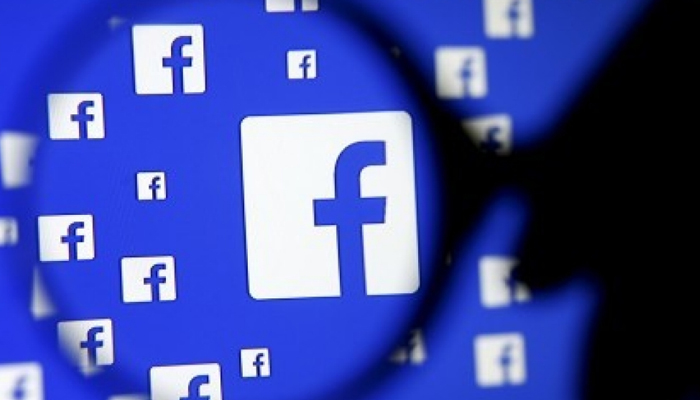Facebook, British political consultancy sued in data storm
The complaint seeks unspecified damages, including possible punitive damages
March 22, 2018

NEW YORK/LONDON: A US resident has sued Facebook and a British-based political consultancy for obtaining data from millions of the social media site's users without their permission, while an academic at the centre of the storm accused both firms of scapegoating him.
The complaint filed at the US District Court in San Jose, California, marked the first of what may be many lawsuits seeking damages over Facebook's ability to protect user data, and exploitation of the information by the Cambridge Analytica consultancy to help President Donald Trump's election campaign.
Facebook has been rocked this week by a whistleblower who said Cambridge Analytica, which Trump hired for the 2016 campaign, improperly accessed information on Facebook users to build detailed profiles of American voters.
This revelation has knocked nearly $50 billion off Facebook's stock market value in two days and hit the shares of Twitter and Snap over fears that a failure by big tech firms to protect personal data could deter advertisers and users and invite tougher regulation.
Mark Zuckerberg, Facebook's founder and chief executive, who has been quiet on the controversy, is to address the revelations later on Wednesday, a source at the company told Reuters.
The proposed class-action complaint was filed late on Tuesday by Lauren Price, a Maryland resident.
"Every Facebook user has an interest in this lawsuit, and the enforcement of their privacy rights," John Yanchunis, a lawyer for Price, told Reuters on Wednesday.
The complaint seeks unspecified damages, including possible punitive damages. Facebook and Cambridge Analytica did not immediately respond on Wednesday to requests for comment.
A former Facebook manager who was responsible for policing the network's data handling procedures in 2011-2012 said he had warned senior executives about the issue.
The manager, Sandy Parakilas, said he had told them that Facebook's failure to police how outside software developers used its data put the company at risk of major data breaches.
"There was very little detection or enforcement," he told a British parliamentary committee via a video link.
Swing voters
The academic who provided the data, psychologist Aleksandr Kogan, told the BBC that Cambridge Analytica had greatly exaggerated its role in Trump's victory. Facebook and Cambridge Analytica have both blamed Kogan, who gathered the data by running a survey app on Facebook.
Kogan combines the roles of an academic at Cambridge University and a web entrepreneur based in San Francisco.
US political campaigns collect large amounts of data, hoping to target swing voters sympathetic to their message.
Cambridge Analytica stood out for the scale of claims in its marketing materials to "collect up to 5,000 data points on over 220 million Americans" in all its activities. It uses techniques based on personality traits and then applies analytic tools to pinpoint supporters.
However, Kogan said the services provided by the consultancy had been greatly exaggerated.
"I think what Cambridge Analytica has tried to sell is magic, and they've made claims that this is incredibly accurate and it tells you everything there is to tell about you. But I think the reality is it's not that," he said.
Arron Banks, who campaigned for Britain to leave the European Union in a 2016 referendum, also questioned the value of psychologically-based data.
Banks told Reuters that Cambridge Analytica had unsuccessfully pitched for work with his Leave.eu campaign group. "I think they are nothing more than a company that places Facebook ads and shrouds in a sort of mystery," he said.
Kogan's application, "thisisyourdigitallife," offered a personality prediction and billed itself on Facebook as "a research app used by psychologists".
Kogan said he had gathered the data in 2014. He was then approached by Cambridge Analytica who provided the legal advice around its use, he added.
Facebook says Kogan then violated its policies by passing the data to Cambridge Analytica for commercial use, saying on Friday he "lied to us". Cambridge Analytica said it destroyed the data once it realised the information did not adhere to data protection rules.
"My view is that I'm being basically used as a scapegoat by both Facebook and Cambridge Analytica," said Kogan.
"We were assured by Cambridge Analytica that everything was perfectly legal and within the limits of the terms of service.
"Cambridge Analytica has denied various allegations made about its business practices in recent media reports.
British Prime Minister Theresa May said she backed an investigation into the consultancy, while the German government also expressed its concern.
In Europe, the tax affairs of tech giants have become a hot political issue.
On Wednesday, the European Commission proposed rules to make digital companies pay their fair share of tax, with Facebook and its peers set to foot much of the bill.
Personality test
Alexander Nix, the head of Cambridge Analytica, said in a secretly recorded video broadcast on Tuesday that his company had played a decisive role in Trump's election victory.
He was suspended by the company shortly before the video was shown on Britain's Channel 4 News.
Around 270,000 people downloaded the app, Facebook said. The app scored the results of each quiz and gathered up data from test-takers' Facebook accounts.
However, it also pulled down the data of their Facebook friends, vastly increasing the size of the sample.
Kogan put the number of app users as closer to 200,000.The researcher said, in total, he passed the data of around 30 million American Facebook users to SCL, a government and military contractor that is the parent of Cambridge Analytica.
Media reports have put the total number of Facebook profiles collected at around 50 million users.
US and European lawmakers have demanded an explanation of how Cambridge Analytica gained access to user data in 2014 and why Facebook failed to inform its users.
Facebook said it had been told by the Federal Trade Commission, the leading US consumer regulator, that it would receive a letter this week with questions about the data acquired by Cambridge Analytica.
It said it had no indication of a formal investigation.











